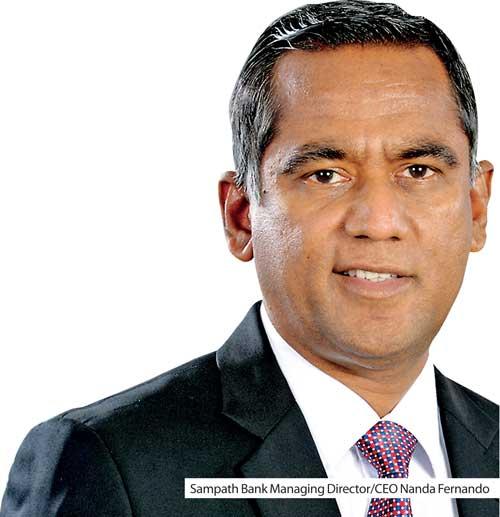29 Jul 2020 - {{hitsCtrl.values.hits}}
 This is part of the interview series titled ‘Mirror Business S&P SL2 - Insights’ conducted in collaboration with the Colombo Stock Exchange (CSE). The interview features Sampath Bank PLC Managing Director/CEO Nanda Fernando. Following are excerpts from the interview.
This is part of the interview series titled ‘Mirror Business S&P SL2 - Insights’ conducted in collaboration with the Colombo Stock Exchange (CSE). The interview features Sampath Bank PLC Managing Director/CEO Nanda Fernando. Following are excerpts from the interview.
How has COVID-19 impacted the business operations of Sampath Bank and how has the bank responded to these impacts?
In terms of banking operations, Sampath Bank was able to minimise the impact of COVID-19 due to our advance preparedness and strong digital platforms. When the first COVID-19 patient was found in Sri Lanka in January, we reviewed our BCP plan to check if we have the necessary details to face the situation. We found some areas to be lacking and took immediate steps to strengthen the plan. So, by the time the lockdowns came in March, we had already established secure remote working facilities to all our critical staff, segregated the Sampath team into three groups and setup safety measures at branches and head office.
What was impacted severely was our business. Since we were operationally prepared, we spent our time during the lockdowns to support the customers and meet their needs. This is why we were able to introduce innovative services such as doorstep cash delivery and onboard thousands of customers to our digital platforms.

What is your assessment on how the banking industry will fare over the next 18 months and what challenges do you anticipate in the industry?
Next 18 months undoubtedly will be a challenging time, not only for the banking industry or Sri Lanka but also for most industries and the whole world. This is because the COVID 19 pandemic has adversely impacted both civilian life and business activity alike.
With governments taking bold action and the industries doing the necessary reorganisation and restructuring, the banking industry will play its part in being the facilitators and pro creators of growth. In doing so, the banking industry will have to take a hit in terms of profitability. But we, as an industry, think this is necessary and critical for both the local and global economy to return to normalcy. The biggest challenge will be to control the spread of the pandemic. The longer it takes, the more painful the economic costs would be.
Is your business model resilient enough to recover from the impact of a crisis and manage the potential crises in the future?
This crisis is not something that anyone in the world was prepared to face. However, most of the businesses and industries have survived thus far. All industries have realised that we need to help each other to survive to ensure the collective survival.
Thus far, our business model like many others has been proved resilient. Sampath Bank has in fact been able to leverage on our digital capabilities and pass benefits to our customers. We remain resolute and our culture is to take challenges head on. We are confidant of our business model.
Could you elaborate a few growth prospects for the bank going forward and how you intend to capitalise on these growth opportunities?
The biggest opportunity this crisis has created is on digitisation. This crisis has acted as a catalyst and pushed customers to use digital channels to conduct their day-to-day banking operations. Although the digital wave was building up, the time lag made certain investments costly as recovery of such investments was slow. But with higher adoption rates now, the investments can be made and those who already had the investments made such as Sampath Bank can benefit from it.
In addition to this, the crisis will give birth to many tech and innovative businesses. Lending to these businesses cannot be done using traditional models. This will require new thinking and new ways of banking. These are the opportunities we see in the current context.
How is the bank responding to the credit relief announced by the government in the wake of COVID-19 and how much has the bank already lent out to SMEs?
We have responded very positively to the government proposal. In fact, we think it’s necessary and the banks should play their part in reviving the economy. We have already set up a low interest loan scheme and pledged nearly Rs.5 billion for it as an initial step.
Focusing on the shareholder, what efforts and initiatives are you taking to drive shareholder value amidst this pandemic?
Creating shareholder value is a long-term thing. At times, you can generate returns by earning higher profits. But at times like this, we have to generate returns by earning goodwill that we can convert to profits in the long run. This is how Sampath Bank’s journey has been.
However, this doesn’t mean we don’t capitalise on opportunities presented that can generate both customer value and shareholder returns. Sampath doorstep cash delivery and on boarding customers to Sampath Vishwa platforms over the phone during the COVID lockdowns are classic examples on how Sampath Bank attempts to keep both customers and shareholders satisfied.
Finally, what is your message to the shareholders of Sampath Bank PLC, especially in the context of COVID-19 and the way forward?
Our message is that we, the Sampath Team, will always strive to achieve the best and we will continue to deliver the results that is expected of us. We will always keep our customers’ interests at heart in everything we do and through that we will create lasting and consistent value to our shareholders.
24 Dec 2024 9 hours ago
24 Dec 2024 24 Dec 2024
24 Dec 2024 24 Dec 2024
24 Dec 2024 24 Dec 2024
24 Dec 2024 24 Dec 2024